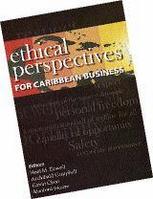
Title: Ethical Perspectives For Caribbean Business
Editors: Noel M. Cowell, Archibald Campbell, Gavin Chen, Stanford Moore
Publisher: Arawak Publications, Kingston, Jamaica
Reviewed by: Susan Gordon - Business Reporter
Ethical perspectives for Caribbean Business is a collection of research papers and informed opinions from local and regional social scientists, on the role of ethics and lack of good ethical practices in Caribbean societies.
The 14-chapter book posits theories and issues on ethics, which are not entirely new, but could be particularly useful to tertiary students of philosophy or business.
The content is also a stimulus for societies to bring to focus and arrest the pervasive corruption and poisoned morals portrayed by their business and political leaders.
A writer in an earlier chapter underscores that there is a central belief among the general population that the credible leader is truthful, trustworthy and competent.
Moreover, the book has tossed the concept of 'business ethics' out the door, with Noel M. Cowell, in his introductory chapter, likening it to "impression management" where persons are willing to tell a lie, bluff or compete, to earn money.
The issues of unethical management decisions, corporate scandals, lack of transparency and corporate governance, corruption, extortion and social exclusion are raised from many angles, hauling the froward public and even foreign investors into the mix as guilty agents.
Using a combination of prose and tables, the close to 20 writers - experts in their field of social science - have made several findings and suggested workable solutions to mitigate ethical dilemmas in the society.
This includes the very sound recommendation from Anthony S. Johnson, writer of Chapter nine, who proposes students get grounding in ethics.
Ethical perspectives for Caribbean Business is even more timely in the face of the global financial crisis now being experienced, which has some of its origin in unethical practices of deception and greed.
Cowell presents the reader with various concepts of ethics, one being a definition as "Equity and honesty in the actions and transactions of managers ..."
The final chapter, authored by Peter Moses, details his personal encounter with being tempted to commit an unethical act doing business.
Moses lauds the media for its role in the process of ensuring transparency in society, but suggests that all sectors of the business community should develop a code of ethics, including the local banking sector which, he says, still does not have one.
Moses said society is worse off for every act of corrupt behaviour carried out daily.
Chapter one, on 'Ethics and Morality', explores moral concept and concludes they are nuances of right and wrong conduct. The second chapter, a more philosophical 'palate', delves into natural law and ethics, and points out a theory of Socrates that, "No honest man can survive politics."
The link with ethics and the economy addressed the opinion that everyone has equal rights to preserve life and strive for a degree of life satisfaction. This is said to be dependent on economic progress, and a denial to all persons of this right to economic participation is wrong and, therefore, unethical.
The book criticises the delay in implementing policies which could mitigate social exclusion, a variable for extortion. Members of the private sector who discriminate against job seekers from inner cities were not spared.
Dr Steven Vasciannie, in Chapter six, on ethics in international relations, argues that subjecting investing companies to the same form of information requirement as the host states is needed.
He believes there is a fear, internationally and regionally, that the demand for too much disclosure or transparency could be a deterrent to foreign investment.
The book also makes a very interesting connection between linguistics and ethics, suggesting people manipulate the use of Jamaican creole and standard English as negotiation tactics.

